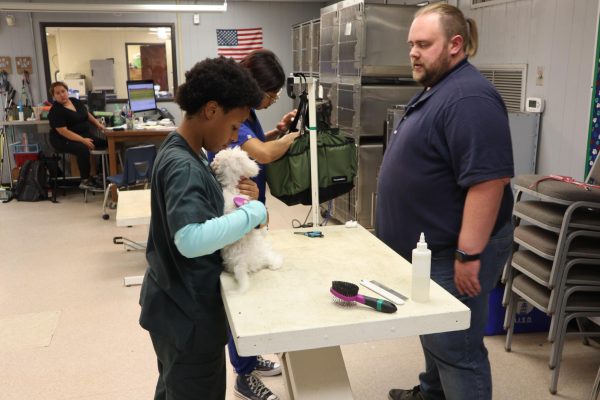Kendrick Lamar covers major issues in new album
April 23, 2015
Two years after Kendrick Lamar burst into the hip hop scene with his second studio album, good kid m.A.A.d. City (which is already being hailed as a classic), the self-appointed “king of hip-hop” returns with an intense and controversial message.
To Pimp A Butterfly share’s Kendrick’s personal anecdotes through a recurring poem while exclaiming that today’s society still practices racism. K. Dot takes this big picture concept album and spreads his ideas through a funky, bass-reliant production and multitudes of metaphorical poetry.
Straight from the intro, as the low-pitched echo of “To Pimp A Butterfly” rings through the listener’s ears, you can immediately recognize Kendrick’s more mature tone as he skillfully delivers verses from two different perspectives. One is from the racist stereotypical view of the average black entertainer. The other being comes from capitalist America who takes the shape of Uncle Sam. Kendrick continues to explain these propagations with songs like “Institutionalized” in which he incorporates minor vocals from fresh female artists such as Anna Wise and a small bridge in which rap icon Snoop Dogg describes Kendrick Lamar as a “5-foot something kid” in “a city so divine.”
Shortly after track four on the album, a poem begins that reappears throughout the album as he continues to recite the confession with two more lines after every song. The track “u” is arguably one of the best recent displays of an artist’s true nature outside of music, shows the internal turmoil and negativity Kendrick feels after leaving his home city. According to the second half of the song, Kendrick claims that he suffered a loss after leaving Compton and stacks the blame on his shoulders due to the fact that he was away from home while his companion passed away. K. Dot unleashes a dark and twisted frame of mind during his depression. These tales of his mournful times only compliment the variety of testimonies he has to offer.
As the underlying story progresses, Kendrick returns home after dealing with his internal struggle. This is where the album shines in terms of replay ability. As I played through To Pimp A Butterfly for the first time, I thoroughly enjoyed each track but it came to my attention that these songs could not standalone. Unlike Butterfly’s predecessor good kid m.A.A.d. City, which had a tremendous amount of replay value. Many of those tracks could be played as singles, disregarding the fact that they were part of a whole narrative. To Pimp A Butterfly succeeds in this during the third act with songs like “Hood Politics” and “The Blacker The Berry.” Unfortunately, this comes a little too late in the album and is inconsistent.
Kendrick continues his discussion on race issues with “The Blacker The Berry” and contemplates the value of currency in “How Much A Dollar Cost?” He finishes off the album with an inexplicably long track, “Mortal Man” in which he reminds his fans that he is nothing more than a man, much like themselves. Following the concluding track of the project, the listener is greeted with a very familiar voice to hip-hop fans. Tupac’s voice, clear as ever, speaks to Kendrick responding to questions that he asks as he conducts an interview with a deceased man. Tupac lives through Kendrick’s music, drawing his part in the album to a close with his final quote; “Because the spirits, we ain’t even really rappin’, we just letting our dead homies tell stories for us.” Through this interview, Kendrick reads a poem to the hip-hop icon about the nature of a caterpillar. It is shunned in the beginning and glorified after it emerges from it’s cocoon, much like himself after revealing his artistry to the world. Concluding the album, Kendrick realizes that he is next in line to change the world, much like his idols.
Throughout the album, Kendrick proves that his reign as the “hip-hop messiah” is well deserved. He consistently supplies another project with nearly no major issues that may plague it. K. Dot delivers thought-provoking tales that changed my perspective on many social issues. He does a fantastic job of personifying currency and racism as Uncle Sam and Lucifer. Overall, To Pimp A Butterfly may not exceed expectations in comparison to good kid m.A.A.d. City, but it most definitely meets them.
9/10







